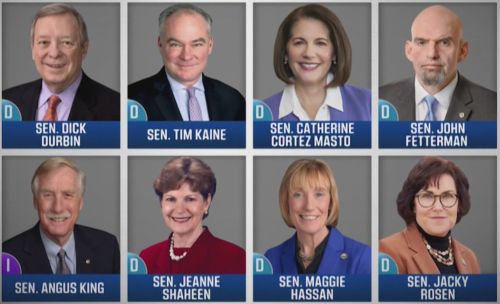

The long-term damage may not be felt immediately, but it will resonate. Millions will open letters in the coming months announcing premium hikes or coverage lapses.

By Matthew A. McIntosh
Public Historian
Brewminate
Introduction
The longest government shutdown in American history is coming to an end, not with resolution, but with surrender. After weeks of paralysis, with federal workers laboring without pay and millions of Americans bracing for the loss of Affordable Care Act subsidies, eight Senate Democrats broke ranks and joined Republicans to push through a stopgap deal. The measure reopened the government but failed to secure any guarantee to preserve ACA premium tax credits, a core Democratic promise that helps keep health insurance within reach for working families.
The deal was hailed in Washington as a “compromise,” but the victory belongs elsewhere, to a Republican Party bent on dismantling the ACA and a president who has long sought to strangle it. The Democratic defectors justified their decision by citing GOP assurances that negotiations over extending ACA subsidies would continue in December. But anyone who has followed Donald Trump’s politics of brinkmanship knows those promises ring hollow. What the deal truly represents is the erosion of political will, a collapse of conviction at the very moment Democrats had the leverage to protect millions from soaring health care costs.
For all the talk of relief, this deal achieves little beyond optics. It restores paychecks for federal workers, a necessary good, but it leaves the structural damage untouched. The same families now celebrating the reopening of government will soon face another crisis when subsidies lapse and premiums spike. And in the broader narrative of political courage, Democrats have written themselves into the wrong chapter: the party that wins elections on health care, then blinks when it matters most.
What the Deal Did, and Did Not, Accomplish
The measure that brought the government back to life was passed with a 60–40 procedural vote in the Senate. It funds operations only through January, buying time for further negotiations but securing no substantive commitments on health care. The deal’s most touted promise, a December debate over the Affordable Care Act premium tax credits, is just that: a promise. There is no binding requirement for Congress to extend those subsidies before they expire. In other words, millions of Americans are now counting on a discussion that may never happen.
Seven Democrats and one Independent who causes with them provided the crucial votes. The eight senators who betrayed their trust are John Fetterman (Pennsylvania), Catherine Cortez Masto (Nevada), Angus King (Maine), Dick Durbin (Illinois), Maggie Hassan (New Hampshire), Tim Kaine (Virginia), Jackie Rosen (Nevada), and Jeanne Shaheen (New Hampshire). Thos names should ring in the minds of all those now facing losing affordable access to health care.
Each of them faces little political consequence, either freshly reelected to six-year terms or preparing to leave the Senate entirely. That insulation from accountability made them perfect partners for this maneuver. Their defections fractured a party that had, only days before, won decisive victories across the country while standing firm during the shutdown.
The final text of the deal restores pay for federal workers, a relief long overdue, but it trades away hard-won leverage that could have secured health care stability for millions. This is the kind of short-term political calculus that Washington calls “governing” but the rest of the country calls betrayal. The government may have reopened, but the trust between Democratic leadership and the voters who put them there is beginning to close.
The Health Care Stakes
The expiration of Affordable Care Act premium tax credits is not a political abstraction; it’s an economic disaster waiting to happen. Without an extension, premiums on marketplace plans will spike by hundreds of dollars a month for middle- and lower-income Americans. Analysts have warned that the loss of subsidies could push millions off their coverage entirely, undoing more than a decade of progress in expanding access to health care. The deal Democrats accepted did nothing to address this cliff. It merely postponed the pain.
Meanwhile, the same shutdown that was supposedly meant to protect Americans’ economic stability has already done real harm. Hundreds of thousands of federal workers missed multiple pay periods, stretching credit, delaying bills, and draining savings. Federal programs from food assistance to housing aid were disrupted. Families across the country were told to “hang on,” only to learn that the deal their elected officials struck offers no relief from rising medical costs.
The contradiction is stunning: a government shutdown justified as leverage for working people ends with those same people footing the bill. As premiums rise and coverage lapses, the working families Democrats claim to champion will feel abandoned, not by their enemies, but by their allies.
The failure to secure the subsidies isn’t just a policy omission; it’s a moral one. Health care is not a luxury item to be negotiated away in backroom deals. It is the foundation of economic security and personal dignity. Yet, with one vote, Democratic senators traded it for a temporary reopening of the bureaucracy, leaving millions to wonder if the fight for affordable care has already been lost.
What the Vote Says about Democratic Strategy
The eight Democrats who crossed the aisle insist their votes were about responsibility, about reopening the government and paying federal workers. But many inside their own party view it differently: as capitulation dressed in pragmatism. The irony is impossible to miss. Democrats just scored sweeping electoral victories during the shutdown itself, a signal from voters to stay the course on defending health care and social programs. Instead of harnessing that momentum, leadership folded under pressure, weakening their negotiating hand and emboldening the very opposition determined to dismantle their central legislative achievement, the Affordable Care Act.
Inside the party, frustration with Senate Majority Leader Chuck Schumer has turned to open revolt. Progressives accused him of managing by fear rather than vision, prioritizing optics over principle. Even centrists privately questioned why the majority leader would concede leverage at the precise moment when public opinion was leaning their way. The anger is less about the specifics of the deal than the pattern it represents, a familiar choreography where Democrats claim moral high ground, only to retreat when power demands confrontation.
That retreat speaks to a deeper crisis in Democratic strategy. The party that once positioned itself as the guardian of working families has grown more comfortable preserving the system than challenging it. Republicans operate with ideological ruthlessness; Democrats with procedural caution. The result is a cycle in which principle becomes negotiable, and victory is defined not by change but by survival. It is a politics of exhaustion disguised as compromise.
What makes this surrender particularly corrosive is its predictability. Each time Democrats face a standoff (whether over budgets, appointments, or policy) a faction inevitably breaks, citing the need for stability. But stability without justice is stagnation, and voters know it. Every such compromise reinforces the perception that the two major parties are simply different wings of the same power structure: one openly indifferent, the other quietly complicit.
If leadership believes this kind of deal is sustainable, they’re mistaken. The Democratic base has long tolerated cowardice disguised as pragmatism. The message from last week’s elections was clear: stand up, fight for health care, and don’t blink. Instead, eight senators blinked for the entire party. They may be reopening the government, but in doing so, they are closing off something far more vital: the moral clarity that once defined what it meant to call oneself a Democrat. One wonders if, in fact, that clarity ever really existed. It seems instead to be a smokescreen.
Broader Implications for Democracy and Health Care
The consequences of this deal extend beyond the budget ledger; they strike at the core of democratic accountability. Every election cycle, Democrats campaign on defending health care as a moral right, but when tested, they too often revert to appeasement. The argument that “something had to be done” echoes through Washington’s marble halls, but it rings hollow to those staring at insurance bills they can no longer afford. Rank-and-file Democrats and voters alike see this episode as one more example of political leadership losing its will to fight. The decision may soothe the markets and quiet the headlines, but it leaves millions vulnerable, and disillusioned.
That disillusionment carries a cost. Americans are not just cynical; they are observant. They notice when campaign promises are traded away for procedural peace. They see when the party that claims to champion the working class instead protects its own political comfort. By refusing to leverage their victory, Democrats didn’t just compromise policy; they compromised trust. It is trust, not ideology, that keeps a democracy functional. Lose that, and you lose the very mandate to govern.
The contrast with Republican strategy could not be sharper. While Trump’s allies pursue an aggressive campaign to dismantle the ACA and entrench executive power, Democrats continue to operate as if restraint will be rewarded. But the reality of contemporary politics is brutal: power fills any vacuum left by hesitation. The Republican Party understands this. Trump understands it. And now, after the longest shutdown in American history, it appears the only group that doesn’t is the Democratic leadership.
The fight for health care was never just about premiums or subsidies; it was about principle. The right to affordable coverage is a cornerstone of modern American life, one that transcends partisan lines. By treating it as a bargaining chip, Democrats have signaled that even the most essential protections are negotiable. The government may have reopened, but the true shutdown, the moral one, remains firmly in place.
Conclusion
Reopening the government should be a moment of relief, a demonstration that democracy, even when strained, could still function for the common good. Instead, it exposed how fragile conviction has become among those charged with defending it. The deal struck by eight Senate Democrats was not compromise; it was capitulation disguised as pragmatism. Their justification rested on a promise from Republicans to “continue negotiations” over ACA subsidies, but promises are not policy. The Affordable Care Act is once again hanging by a thread, and Democrats, not Trump, handed over the scissors.
The long-term damage may not be felt immediately, but it will resonate. Millions will open letters in the coming months announcing premium hikes or coverage lapses, and they will remember who blinked. They will remember that Democrats controlled the narrative, the Senate, and the moral argument, and still yielded. For a party that just secured electoral victories by pledging to defend health care, this outcome is more than a tactical error. It’s an act of political self-harm that validates every criticism of its timidity.
Democrats cannot claim to be the guardians of working families while treating their well-being as expendable. They cannot preach principle in campaign speeches and practice surrender in Senate chambers. The shutdown may have ended, but it leaves behind a deeper crisis, one of leadership and conviction. If Democrats continue to confuse compromise with courage, they will not just lose elections; they will lose the moral authority that once defined their cause.
Originally published by Brewminate, 11.12.2025, under the terms of a Creative Commons Attribution-NonCommercial-NoDerivatives 4.0 International license.


